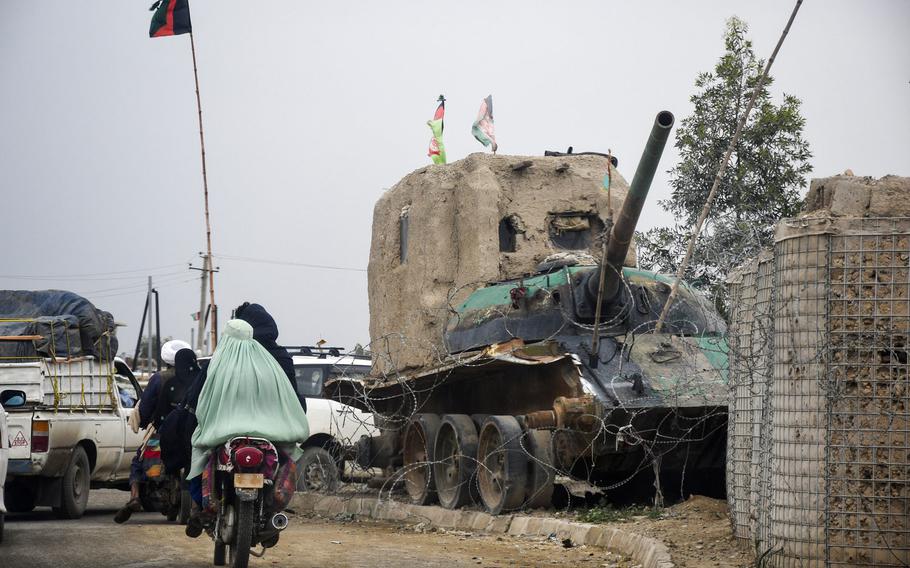
A small checkpoint built around the wreck of a Soviet tank on the outskirts of Lashkar Gah, in Helmand province, was on display April 14, 2019. (J.P. Lawrence/Stars and Stripes)
LASHKAR GAH, Afghanistan – Locals in the provincial capital of Helmand often show visitors reminders of the days when the Taliban attacked: a bathroom where a rocket hit and killed a co-worker; a house where citizens hid from withering crossfire; a checkpoint built from an old Soviet tank that was almost overrun by the militants.
The Taliban attacked Lashkar Gah in 2015, a year after most international troops withdrew from Afghanistan. Their offensive threatened much of the province and led to the return of some U.S. troops to Helmand.
Today, prospects of another U.S. withdrawal - a key part of ongoing talks with the Taliban - have raised hopes for peace but also heightened fears of a Taliban resurgence in battleground provinces such as Helmand, in the country’s south.
Talks this week in Doha between the Taliban and U.S. diplomats, led by Special Representative for Afghanistan Reconciliation Zalmay Khalilzad, will be the seventh round of negotiations aimed at ending America’s longest war.
Hopes are high for a breakthrough in the latest talks, which are focused on the withdrawal of U.S. troops.
“The Americans have decided to give the Taliban some privileges to take the negotiations out of the current situation,” Wahid Muzhda, a Kabul-based political analyst, told Afghanistan’s Tolo News.
Meanwhile, the U.S. is asking for assurances from the Taliban that Afghanistan will not be used as a base for international terrorism.
The talks have so far not included the government in Kabul, which the Taliban views as a U.S. puppet.
Some locals in Lashkar Gah have said the U.S. should stay in Helmand, saying the province would likely see a repeat of the 2015 Taliban offensive if international troops leave again.
“The security is going to get worse; we have experience,” Haji Abdul Ali Sarwari, a civil activist living in the provincial capital, told Stars and Stripes.
With coalition assistance, Afghan forces have recaptured some of the territory that fell to the Taliban four years ago. But in October, a U.S. government watchdog agency said insurgents still held more than half of Helmand, where more American, international and Afghan troops have died than in any other province.
Resigned to a Taliban resurgence In the countryside outside Lashkar Gah, where Taliban flags fly within walking distance of Afghan military bases, locals say the militants will eventually return to power anyway, said Ashley Jackson, a researcher with the Overseas Development Institute.
“I would never say that people living under Taliban control are happy or agree with Taliban rule — far from it — but I think there’s some sort of resignation,” Jackson said in a phone interview.
To get a better understanding of what rural Afghans think about the peace process, Jackson interviewed 90 civilians and Taliban fighters in Helmand, Logar and Wardak provinces. In Nad Ali district, around 25 miles west of Lashkar Gah, people joked with Jackson that the Taliban were going to come back no matter what deal was struck. It may be telling that no one has scrubbed off Taliban graffiti daubed several years ago on the walls of the main government compound.
It wasn’t that people particularly like the Taliban, Jackson said. Her research found women in rural areas, like their counterparts in cities, wanted more rights than the Taliban have given them in the past.
But civilians in Taliban-contested areas told Jackson that they are used to dealing with militants, whom they see as their neighbors and brothers, and have little confidence in the Afghan military. Locals also blamed the U.S. for the war, she said.
“Nearly all civilians saw U.S. forces as responsible for creating and perpetuating the conflict,” said Jackson, who said it was possible that some respondents living under Taliban rule cannot speak freely.
Jackson found that many people in rural areas also believe that, once American and other foreign soldiers leave, Afghans would be able to negotiate peace among themselves.
But both civilians and Taliban fighters told Jackson that they assumed, under any peace deal, militants would remain in charge in the parts of Helmand they control and would seek power in the areas they contest.
Back in Lashkar Gah, residents said they were most concerned about whether the Taliban would take power by force or seek reconciliation with the government in Kabul.
“We have a message for the Taliban: come and be a part of this government, lead this government,” Mohammad Sediq, a council member in Lashkar Gah, told Stars and Stripes through a translator. “Voting can bring you to leadership … Come through the process, then you can lead this country.”
Haji Abdul Aziz, a tribal elder in Kajaki district, said he’s lost seven family members — four sons and three nephews — fighting for the government in Kabul. He said he’s willing to forgive the militants if it leads to the end of war.
“I’m ready to forgive the Taliban… If it’s for the future of this country, I’m ready to sacrifice my feelings for peace,” Aziz said.
Zubair Babakarkhail contributed to this report.
lawrence.jp@stripes.com Twitter: @jplawrence3